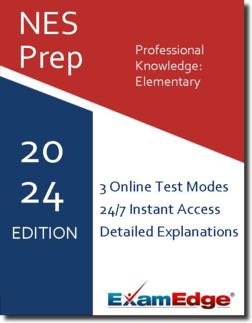NES Professional Knowledge: Elementary (051) Practice Tests & Test Prep by Exam Edge - Review
** Sample images, content may not apply to your exam **
Passing your NES Professional Knowledge: Elementary can be a very stressful time in your life. So why take chances with your preparation? Let us help you through the certification process. See why so many users choose ExamEdge.com to guide them through the process. We only have honest reviews from real users.
Not ready to purchase our complete practice tests yet? Start with a NES Assessment of Professional Knowledge Elementary FREE Practice Test first!
NES Assessment of Professional Knowledge Elementary - Reviews
Excellent
"Thank you so much. I passed my NES Special Education K–12 test the first time thanks to these practice tests. I will recommend this site to anyone who needs to study for a test. Thank you again!! "
"I'm glad I found your website. Your practice tests helped immensely! The ability to review answers while taking the test was a great beginning feature. I also liked having the option to take it like a "real" test - being timed and given the results only at the end. The timed component and the layout of the test/navigation buttons made the actual test day so much easier! I passed both the Elementary Education Subtest 1 and Subtest 2 on my first try! "
"Thanks - I took the NES History Exam today and scored 262 - 42 pts above passing :) I could not have done it without your exams! "
"I passed my test yesterday! Your practice tests made all the difference. Your sample tests to prepare for and pass both the NES Elementary Subtest 1 and 2. I feel that your tests helped me to spotlight the areas that I needed reinforcement, and the explanations included with the questions were super helpful and easy to understand. I'm in Washington State. "
"Exam Edge is awesome.I bought and used the NES Middle School Science Test series from Exam edge and I scored 271 on the test. Thanks a lot. "
TrustPilot Review
"I like to learn using your tests!!!!!"
"Very helpful. I just took the NES 103 for the first time and did very well after using 2 Exam Edge practice tests to help me prep. Nice to pass on the first try. I recommend this resource."
"After a very lengthy study session, I was able to pass this difficult test thanks in great part to the sample exam questions offered by your website. Your sample test questions are far better than the sample test offered by the official NES website. This is due to how your sample questions all have thoughtful and useful explanations for every problem. It would be nice if there were a few more problems that dealt with broad, critical analysis of low level concepts such as discussion questions about how number sets can be broken down into certain patterns. Questions like that would match the real test even more! Thank you for all of the help offered by your service."
"Thank you for providing such an efficient and thorough test preparation program. I purchased tests for both the NES Elementary Subtest I and II and passed both on the first try! I would absolutely recommend this program! "
"Thank you for providing such an efficient and thorough test preparation program. I purchased tests for both the NES Elementary Subtest I and II and passed both on the first try! I would absolutely recommend this program! "
See Why Our Users from 154 Countries Love Us!
Exam Edge is an industry leader in online test prep. We work with institutional partners to offer a wide array of practice tests that will help you prepare for your big exam. No matter how niche your field of interest might be, we are here to help you prepare for test day.
See why our users from 154 countries love us for their exam prep! Including 160 reviews for the NES Professional Knowledge: Elementary exam.
Exam Edge is an industry leader in online test prep. We work with institutional partners to offer a wide array of practice tests that will help you prepare for your big exam. No matter how niche your field of interest might be, we're here to help you prepare for test day.
2.7M+
Users
4M+
Tests Taken
100K+
Unique Tests
18
Years In Business
NES Assessment of Professional Knowledge Elementary - Test Reviews Sample Questions
|
|






